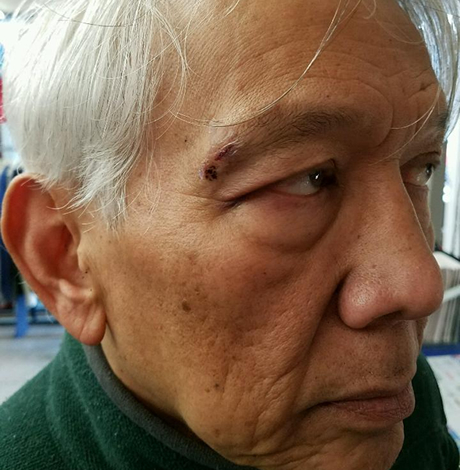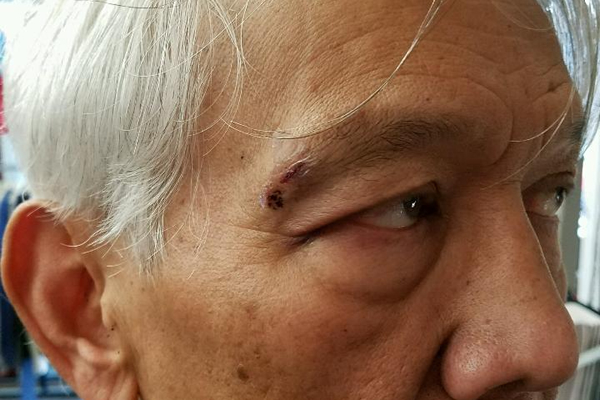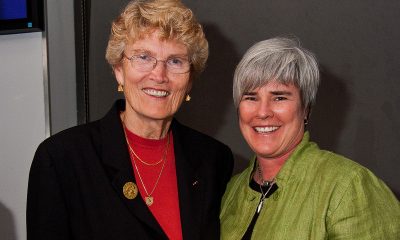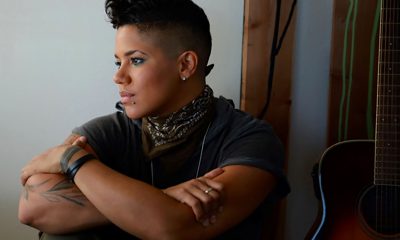Local
Del. gay man who alleged police abuse found guilty
Anti-gay bias allegation not mentioned in trial

GEORGETOWN, Del. — A 66-year-old gay man who filed a complaint against a police officer in Lewes, Del., for allegedly using excessive force to arrest him in January during an altercation at a hospital emergency room was found guilty by a Delaware judge on Tuesday on misdemeanor charges of disorderly conduct, menacing, and resisting arrest.
Judge Rosemary Beauregard of the Sussex County Court of Common Pleas announced at the conclusion of a non-jury trial in Georgetown, Del., that a state prosecutor proved beyond a reasonable doubt that Robaire G. Lizama engaged in “hysterical and abusive” behavior at the hospital that justified his arrest and confirmed he committed the three offenses.
In a development that court observers said was routine for a misdemeanor case like this one, Beauregard handed down an immediate sentence for Lizama that included a 30-day suspended jail term, six months of court-monitored probation, and a $600 fine plus $57 in court reimbursement costs.
In another development likely to surprise LGBT activists familiar with the case, Lizama’s public defender attorney Heather Lingo made no mention during the trial of Lizama’s written complaint to the Lewes Police Department in February alleging that the arresting officer singled him out because he’s gay.
When approached by the Blade after the trial Lingo declined to comment, saying she would have nothing more to say about the case.
“I don’t think he would grab a straight man, bear hug him and then body slam him to the ground and try to tell him he’s being arrested,” Lizama told the Washington Blade at the time he filed his complaint with Lewes Police Chief Thomas Sell in February.
Lizama, a former D.C. resident who lives in Lewes, has accused Officer Tyrone Woodyard of fabricating the charges against him after throwing him to the floor, causing a head injury during a Jan. 25 incident at Beebe Healthcare, a hospital in Lewes.
The arrest report prepared by Woodyard says Lizama had been acting in a disorderly manner after he accompanied a female friend to the emergency room who had been experiencing chest pain. Lizama testified at the trial that he was concerned that nurses who admitted and began to treat his friend weren’t being compassionate in their handling of the situation.
He denied he acted in a threatening or menacing way or that he refused to leave the emergency room when asked to do so by one of the nurses.
Jaqueline Marshall, the emergency room nurse who participated in the treatment of Lizama’s friend, and hospital security officer Julian Peacock testified that Lizama – while understandably upset that his friend may have been suffering from a heart attack – behaved in such an aggressive and hysterical way that the nursing staff became alarmed and felt threatened.
Marshall, Peacock and Officer Woodyard each testified that Lizama “lunged” at Woodyard while Woodyard and Peacock were escorting Lizama out of the emergency room area to the hospital’s lobby, where they told him he would have to wait while his friend was treated.
Woodyard told the court he couldn’t immediately determine whether Lizama was armed when Lizama suddenly turned toward him in an aggressive way. He said he decided to “taken him down” on the floor out of concern that Lizama could have harmed the nurses and others walking through the emergency room area.
Woodyard and Peacock testified that when Woodyard tried to handcuff Lizama after telling him he was under arrest, Lizama resisted the officer’s attempts to place cuffs on one of his hands and struggled with the officer and Peacock on the floor. This prompted another nurse to enter the fray and assist in restraining Lizama, the two testified.
Lizama testified that he turned toward Woodyard because he was trying to find his way to the entrance to the hospital lobby and in no way was attempting to attack or harm Woodyard. He said he didn’t resist the officer’s attempt to handcuff him but was moving about because he was in pain and was trying to place his hand over his forehead above his eye, which was bleeding after his head struck the floor when Woodyard knocked him down.
In response to questioning by Lingo, Marshall and Peacock acknowledged that Lizama was admitted to the emergency department for treatment after his arrest. Lingo presented a photo of Lizama as evidence that showed a gash over his eye and pointed to Lizama’s testimony that the injury required a plastic bandage to stop the bleeding,
Assistant State Attorney General Paul Seward, the lead prosecutor in the case, presented as evidence a video recording taken from the hospital’s security cameras that shows Lizama and his friend enter the hospital’s emergency department. The video footage shows Lizama moving about and raising his arms in what appeared to be an agitated state as he talked to one of the nurses at the admissions desk.
Beauregard said she based her verdict on what she called “credible and consistent” testimony by Marshall, Peacock and Woodward. She said the three witnesses along with the video recording at the trial convinced her that Lizama’s behavior was, in fact, posing a potential danger to the hospital staff and other visitors and proved he committed the misdemeanor offenses of disorderly conduct, menacing and resisting arrest.
The judge called Lizama’s testimony at the trial “inconsistent” and “contradictory.”
“All three of those witnesses thought something bad was going to happen,” she said. “He put the public at risk and he put his friend at risk,” said Beauregard, saying the disturbance Lizama was creating could have interfered with the nurses’ and doctors’ effort to diagnose and treat the friend.
It was later determined that the friend did not have a heart attack.
Lizama told the Blade after the trial that he had told Lingo, his attorney, about his belief that Officer Woodyard targeted him because he’s gay. He said he doesn’t know why Lingo didn’t raise that concern during the trial.
He has acknowledged that he doesn’t recall Woodyard making anti-gay remarks or making a reference to his sexual orientation at the time of the arrest but said he nevertheless got the impression that the officer assumed he’s gay.
When approached after the trial and asked by the Blade about Lizama’s allegation of anti-gay bias, Officer Woodyard refused to comment, saying he wasn’t authorized to speak to the media.
“I’m totally shocked,” Lizama said of the judge’s guilty verdict in an interview after the trial.
He said Lingo suggested he accept a plea bargain offer that Seward made minutes before the start of the trial. Still reeling over the verdict, Lizama said he didn’t remember what the terms of the plea offer consisted of.
“I told my attorney if I don’t think I’m guilty why would I plead guilty?” said Lizama. “I wholeheartedly didn’t think I was guilty so I said no. I wanted to go with the trial.”
District of Columbia
Two charged with assaulting, robbing gay man at D.C. CVS store
Incident occurred after suspects, victim ‘exchanged words’ at bar

D.C. police just after 1 a.m. on April 10 arrested two men for allegedly assaulting and robbing a gay man inside a CVS store at 1418 P St., N.W., according to a police report and charging documents filed in D.C. Superior Court.
The charging documents state that the alleged assault and robbery occurred a short time after the three men “exchanged words” at the gay bar Number 9, which is located across the street from the CVS.
The arrested men are identified in the charging documents as Marquel Jose Diaz, 27, of Northwest D.C., and Lorenzo Jesse Scafidi, 21, of Elizabeth City, N.C. An affidavit in support of the arrest for Diaz says Diaz and the victim “were previously in a relationship for a year.”
Court records show Diaz was charged with Simple Assault, Theft Second Degree, and Possession of a Controlled Substance. The court records show the controlled substance charge was filed by police after Diaz was found to be in possession of a powdered substance that tested positive for cocaine.
Scafidi was charged with Simple Assault and Theft Second Degree, the court records show.
The D.C. police report for the incident does not list it as a suspected hate crime.
The court records show both men pleaded not guilty to the charges against them at a Superior Court arraignment on the day of their arrest on April 10. The records show they were released by a judge while awaiting trial with an order that they “stay away” from the victim. They are scheduled to return to court for a status hearing on May 21.
The separate police-filed affidavits in support of the arrests of both Diaz and Scafidi each state that the two men and the victim “exchanged words” inside the Number 9 bar. The two documents state that both men then entered the CVS store after the victim went to the store a short time earlier.
Scafidi “came into the CVS shortly after and entered the candy aisle and slammed Complainant 1 [the victim] to the ground causing Complainant 1’s phone to fall out of CP-1’s pocket,” one of the two affidavits says. It says Scafidi “again picked up CP-1 and slammed him to the ground.”
The affidavit in support of Diaz’s arrest says Diaz also followed the victim to the CVS store after words were exchanged at the bar. It says that after Scafidi allegedly knocked the victim down in the candy aisle Diaz picked up the victim’s phone, “swung on” the victim “while he was still on the ground,” and picked up the victim’s watch before he and Scafidi fled the scene.
Without saying why, the two arrest affidavits say Diaz and Scafidi returned to the scene and were arrested by police after the victim and at least one witness identified them as having assaulted and robbed the victim.
Attorneys representing the two arrested men did not respond to phone messages from the Washington Blade seeking comment and asking whether their clients dispute the allegations against them.
The victim also did not respond to attempts by the Blade to obtain a comment from him. The police report says the victim is a resident of Fairfax, Va.
District of Columbia
Bowser calls for ‘extraordinary’ response to reduction in D.C. budget
Impact on city funding for LGBTQ programs and grants unclear

D.C. Mayor Muriel Bowser on April 15 issued an executive order calling for “extraordinary actions,” including “significant cuts in District Government services,” to address a decision by Congress to cut the city’s current budget by $1.1 billion.
The nine-page executive order points out that these actions became necessary after the U.S. House of Representatives has so far declined to vote on a free-standing bill approved by the U.S. Senate last month that would restore the $1.1 billion D.C. budget cut initially approved by the House.
In addition to large-scale cuts in city services, the mayoral order says the congressionally imposed city budget cut will bring about city “hiring freezes, financial impacts to employees, reductions and terminations in contracts and grants, and closures of District Government facilities.”
The order adds, “These are unprecedented actions given that the District itself adopted and is able to implement a fully balanced budget, but they are necessary due to the Congressional cut to the District’s budget and its inaction in timely fixing its legislative error.”
The House adjourned this week on a recess until the end of April, and congressional observers say it is unclear whether the majority Republican House will take up the Senate bill to undo the D.C. budget cut when the House returns from its recess. President Donald Trump has called on the House to approve the bill to restore the full D.C. budget.
Among the D.C. LGBTQ organizations and those providing services to the LGBTQ community that receive D.C. government funding and that could be impacted by the budget cuts are Capital Pride Alliance, which is organizing WorldPride 2025 set to take place in D.C. next month; and Whitman-Walker Health, one of the city’s largest private healthcare organizations that provides medical services for LGBTQ clients.
Also receiving city funding are the Wanda Alston Foundation, which provides housing services for LGBTQ people; and the LGBTQ youth advocacy and services organization SMYAL.
Spokespersons for the four organizations couldn’t immediately be reached to determine if they knew whether the soon-to-be implemented budget cuts would have an impact on the city funding they currently receive.
In response to questions from news reporters during an April 15 press conference call to discuss the Bowser executive order, Jenny Reed, director of the D.C. Office of Budget and Performance Management, said details on specific programs or funding allocations set to be cut would not be known until the mayor submits to the D.C. Council her Supplemental FY 2025 budget along with her proposed FY 2026 budget.
Reed was joined at the press briefing by Lindsey Parker, Mayor Bowser’s chief of staff; and Tomas Talamante, director of the Office of Intergovernmental Affairs.
They and other city officials have said the impact of the congressionally imposed city budget cut was expected to be lessened but remain highly problematic by Bowser’s decision to invoke a 2009 law that allows the city to increase its own spending without approval by Congress under certain circumstances.
The mayor has said under that law, the city would need to cut its FY 2025 budget by $410 million rather than by $1.1 billion. It couldn’t immediately be determined whether House Republicans, who initiated the requirement that the D.C. budget be cut by $1.1 billion, would challenge the mayor’s plan to invoke the 2009 law to reduce the size of the budget cut.
“Without the ability to fully execute the Fiscal Year 2025 budget as adopted and approved by the District, this gap will force reductions in critical services provided by our largest agencies, including the Metropolitan Police Department and the Fire and Emergency Medical Services Department,” the mayor’s executive order states.
“The District will continue to work with members of the House of Representatives to urge them to vote to fully restore the District’s Fiscal year 2025 budget and will continue to work with President Trump to strongly encourage the House of Representatives to take that action,” the order says.
District of Columbia
LGBTQ budget advocates fight for D.C. resources in a tough fiscal year
‘Trying to preserve life-saving services’ amid $1 billion cut

The months and days leading up to June are especially busy for LGBTQ Washingtonians. For one group, the DC LGBT Budget Coalition, which works year-round to ensure LGBTQ residents are represented and financially supported by the D.C. government, this time of year is their Super Bowl. Beginning in April, the D.C. Council and Mayor’s Office hold budget hearings for the next fiscal year.
With D.C.’s budget now under review, the Washington Blade spoke with Heidi Ellis, coordinator of the DC LGBT Budget Coalition, about the group’s top priorities and their push to ensure continued support for queer communities.
“The LGBTQ Budget Coalition was founded in 2020 at the height of the pandemic, as a way for the community to work together to advocate for key funding and policy changes,” Ellis said. “We recognized we were stronger together. A lot of groups are often pitted against each other for resources and dollars. This coalition was founded out of a need for unity. Since then, we’ve successfully advocated for more than $20 million in dedicated LGBTQ investments.”
In addition to coordinating the coalition, Ellis is the founder and CEO of HME Consulting & Advocacy, a firm that helps build coalitions and advance policy initiatives that address intersectional issues in the LGBTQ community. One of its most powerful tools, she explained, is direct outreach through community surveys.
“We actually do community surveys to see what people need and what’s top of mind,” Ellis said. “Of course, we also pay attention to the broader political landscape — like the current threats to HIV funding. That helps us prioritize.”
Because the coalition is comprised of more than 20 organizations across various sectors —healthcare, housing, community organizing — Ellis said its diversity enables it to connect grassroots needs to potential policy solutions.
“Our coalition includes service providers, community groups, health and housing advocates-folks who are deeply plugged into what’s happening on the ground,” she said. “They help determine our direction. We know we don’t represent every queer person in D.C., but our coalition reflects a wide range of identities and experiences.”
The insights gathered through those surveys ultimately inform the coalition’s annual budget proposal, which is submitted to the Council and mayor.
“That’s how we got to our FY26 priorities,” she said. “This year, more than ever, we’re fighting to protect what we’ve already secured — funding and policies we’ve had to fight for in the past. We know there’s concern around this budget.”
One of the challenges this year is that the D.C. government’s operating budget and some of its legislation must be approved by Congress. With a projected decline in tax revenue and a Republican-controlled Congress that has historically opposed LGBTQ funding, the Coalition has had to think strategically.
“Even before the situation on the Hill, the CFO projected lower revenue,” Ellis said. “That meant cuts to social programs were already coming. And now, with the $1 billion slashed from D.C.’s budget due to the continuing resolution, we’re not only fighting for D.C.’s budget and autonomy, but also trying to preserve life-saving services. Our message is simple: Don’t forget about queer people.”
This year’s proposal doesn’t include specific dollar figures. Instead, the Coalition outlines five funding priority areas: Healthcare, Employment & Economic Equity, Housing, Safety & Community Support, and Civil Rights.
Why no exact amounts? Ellis said it’s because not all solutions are financial.
“Some of our asks don’t require new funding. Others build on existing programs-we’re asking whether the current use of funds is the most effective. We’re also proposing policy changes that wouldn’t cost extra but could make a real difference. It’s about using what we have better,” she said.
When drafting the proposal, the Coalition tries to prioritize those with the most pressing and intersecting needs.
“Our perspective is: If we advocate for the most vulnerable, others benefit too,” Ellis said. “Take LGBTQ seniors. Some may have done well in life but now face housing insecurity or struggle to access affordable healthcare. Many in our coalition are elders who fought on the frontlines during the AIDS epidemic. They bring critical historical context and remind us that Black and brown communities bore the brunt of that crisis.”
“I love our coalition because it keeps us accountable to the moment,” she added. “If we center those most marginalized, we can make an impact that lifts everyone.”
In addition to healthcare and housing, safety remains a top concern. The Coalition has fought to maintain funding for the Violence Prevention and Response Team (VPART), a city-supported group that includes MPD, community-based organizations, and the Mayor’s Office of LGBTQ Affairs. VPART responds to crimes affecting the LGBTQ community and connects victims to legal, healthcare, and housing services.
“We’ve pushed to make VPART more proactive, not just reactive,” Ellis said. “The funding we’ve secured has helped survivors get the support they need. Cutting that funding now would undo progress we’re just beginning to see.”
At the end of the day, Ellis emphasized that this process is about far more than spreadsheets.
“A budget is a moral document,” she said. “If we’re not represented, you’re telling us our lives don’t matter at a time when we need protection the most. When people can’t get food, medicine, housing — that has a devastating impact. These are vital services.”
The DC LGBT Budget Coalition is urging residents to support a letter-writing campaign to D.C. Council members and the mayor. You can send a letter here: https://actionnetwork.org/letters/fully-fund-dcs-lgbtq-communities
Read the full FY26 budget proposal here: https://drive.google.com/file/d/1bTrENnc4ZazJTO6LPrQ3lZkF02QNIIf1/view
-

 District of Columbia3 days ago
District of Columbia3 days agoFinal push to raise funds, fill D.C. hotels as WorldPride nears
-

 District of Columbia3 days ago
District of Columbia3 days agoReenactment of 1965 gay rights protest at White House set for April 17
-

 Maryland3 days ago
Maryland3 days agoFreeState Justice: Transgender activist ‘hijacked’ Moore’s Transgender Day of Visibility event
-

 Hungary3 days ago
Hungary3 days agoHungarian MPs amend constitution to ban public LGBTQ events













